#narrative)
Explore tagged Tumblr posts
Text
In fairness, generational spinoffs are fraught by their very nature.
"I want to make a sequel," you say. "A lot of people liked the first one. I want to make another one."
But all the characters in the first one have finished their journeys! They don't have as much room to grow anymore.
"That's fine. This is about their KIDS. That means we get characters who are real real close to the ones everyone already loves, but we get to watch them do different adventures and stuff!"
Except that's hard, because if their parents are the original cast, then you're basically telling your audience to get invested in characters who are those-guys-you-like-but-not-as-good-yet, and also those guys they liked are still presumably in the picture. Not only that, but you're fighting an uphill battle to convince the audience that these are conflicts your new cast needs to solve, rather than something Mom or Dad can fix.
So we're living in the long shadow of previously-successful characters. How do we get out from under it?
Kill the parents.
Physically separate the kids from the parents somehow.
Make the parents shitty parental figures.
The first one is risky because not only have you told your audience to care about somebody else, but you've unceremoniously removed the characters they DID like.
The second one is doable, but not every plotline lends itself to this, and you also risk the audience asking why they aren't watching a DIFFERENT show, one where the main conflict is about the parents trying to make their way to the kids.
The third, in theory, solves a ton of problems! The parents' original skillset doesn't necessarily map to parenthood, so it's justifiable. On top of that, not only does it give your former-protagonists-turned-supporting-cast a potential arc: they need to learn how to fix their parenting style! And if the kids want to fix the relationship too, then they're suddenly trying to resolve the same conflict that the audience wants to see resolved!
...It's just that it can be hard to convincingly make a character kind of bad at parenthood without making them seem awful overall, and that means it's easy to accidentally do a character assassination.
Generational spin-off media is like “okay, what would be the most in-character way for the previous show’s protagonist to comprehensively fail as a parent?”
47K notes
·
View notes
Text
The Silent Guardian - A Bat man story
Gotham City was eerily quiet, an unsettling hush that seemed to wrap around its darkened streets. In the heart of the city, atop Wayne Tower, Bruce Wayne stood, contemplating the latest threat to his beloved Gotham. It was not the typical villain causing mayhem but something far more elusive: an unknown entity referred to only as "The Whisperer."
Reports of criminals disappearing without a trace had started circulating. The city's underworld was abuzz with rumors about a silent guardian who moved like a shadow, leaving nothing but whispers in their wake. Determined to uncover the truth, Batman set out to investigate this new player in Gotham's dangerous game.
One night, as Batman patrolled the city's rooftops, he felt a presence trailing him. It was subtle, almost imperceptible, but he knew he wasn't alone. Using his detective skills, he set a trap, luring the elusive figure into the open. To his surprise, it was a woman dressed in a sleek, all-black suit, her face obscured by a mask.
"You've been following me," Batman said, his voice calm yet commanding.
"I am The Whisperer," she replied, her voice barely audible. "I've come to help Gotham."
Skeptical but intrigued, Batman listened as she explained her mission. She had no grand vendetta or tragic backstory; she was simply someone who had lost too many loved ones to crime. The Whisperer had trained in silence and shadows, using her skills to incapacitate criminals and leave them for the authorities without a trace.
Intrigued by her methods and motivated by a shared goal, Batman proposed they work together. Their partnership was tenuous at first, but they quickly realized their combined strengths made them an unstoppable force against the city's criminals.
One night, they received word that the Scarecrow had returned, unleashing his fear toxin on unsuspecting citizens. Batman and The Whisperer split up to cover more ground, each tackling different parts of Scarecrow's operation. As Batman confronted the Scarecrow, he found himself ensnared in a hallucinogenic nightmare, the fear toxin warping his senses.
Struggling to maintain control, Batman fought through the visions of his darkest fears. Just as he began to falter, The Whisperer appeared, her presence a calming influence. She spoke softly, guiding him through the nightmare with her unwavering voice.
"Remember who you are, Bruce," she whispered. "You're stronger than your fears."
With her support, Batman overcame the toxin's effects and together, they apprehended the Scarecrow, dismantling his operation and saving countless lives. As they stood victorious, a mutual respect and trust had formed between them.
"The Whisperer," Batman said, "Gotham needs you. We need you."
She nodded, her eyes reflecting the determination they both shared. "I'll be there, in the shadows, watching over Gotham."
As dawn broke over the city, Batman knew he had found not just an ally but a kindred spirit. Together, they would continue to protect Gotham from the darkness that lurked in its streets, their partnership a testament to the silent guardians who watch over the city.
By InfoSphere


#batman#fiction#free#short story#story#batman comics#bruce wayne#dc#dc comics#dc fanart#batman fanart#batman and robin#batman the animated series#batman x joker#batfamily#alfred pennyworth#dc cosplay#dc universe#dc rp#batfam#science#story writing#writing#narrative#writers#stories#original story#fantasy fiction#original fiction#flash fiction
22 notes
·
View notes
Text
Writing Tips Master Post
Edit: Some posts may be deleted
Character writing/development:
Character Arcs
Making Character Profiles
Character Development
Comic Relief Arc
Internal Conflict
Character Voices
Creating Distinct Characters
Creating Likeable Characters
Writing Strong Female Characters
Writing POC Characters
Building Tension
Plot devices/development:
Intrigue in Storytelling
Enemies to Lovers
Alternatives to Killing Characters
Worldbuilding
Misdirection
Consider Before Killing Characters
Foreshadowing
Narrative:
Emphasising the Stakes
Avoid Info-Dumping
Writing Without Dialogue
1st vs. 2nd vs. 3rd Perspective
Fight Scenes (+ More)
Transitions
Pacing
Writing Prologues
Dialogue Tips
Writing War
Writing Cheating
Worldbuilding:
Worldbuilding: Questions to Consider
Creating Laws/Rules in Fantasy Worlds
Book writing:
Connected vs. Stand-Alone Series
A & B Stories
Writer resources:
Writing YouTube Channels, Podcasts, & Blogs
Online Writing Resources
Outlining/Writing/Editing Software
Writer help:
Losing Passion/Burnout
Overcoming Writer's Block
Fantasy terms:
How To Name Fantasy Races (Step-by-Step)
Naming Elemental Races
Naming Fire-Related Races
How To Name Fantasy Places
Ask games:
Character Ask Game #1
Character Ask Game #2
Character Ask Game #3
Miscellaneous:
1000 Follower Post
2000 Follower Poll
Writing Fantasy
#masterlist#masterpost#writeblr#writing#writing tips#writing advice#writing help#writing resources#author resources#writer resources#creative writing#character writing#character development#plot development#narrative#book writing#writers block#writer stuff#writer things#fantasy writing#writer ask game#deception-united
21K notes
·
View notes
Text
yes yes characters doomed by the narrative always slap BUT what about characters saved by the narrative? characters who have already given up hope and don't know they have a happy ending? characters who believe they are a lost cause, characters who feel irredeemable, characters who think there's nothing left for them, but the narrative does provide a way out? what about the characters who don't expect anything good, who don't even remember how to wish for it anymore, who get the things they need anyway? what about the characters who actively run from being saved getting saved in a way they can't stop or control. what about being saved by the narrative!!!
#this is inspired by joy from eeaao#but feel free to blorbo it up#judas talks#doomed by the narrative#saved by the narrative#fate#narrative#on writing#on healing#on hope
24K notes
·
View notes
Text
It's always risky killing off a character but if you have to, you must have them HAUNT the narrative. Let their death and absence be constantly felt at some level.
#writing advice#creative writing#writing process#writing#writers#writers on tumblr#writeblr#character death#narrative#character writing
7K notes
·
View notes
Text
I’ve only seen it once so forgive me for not saying more—
—but my favorite sequence is by far the part where ROZ is watching Brightbill finally take flight, and she looks up to try and see him as he gets farther away, but then her view of Brightbill is blocked by the pop-up screen saying “Task Complete.”
And she has to rush after him to get her final look, because of that. Because the Task was getting in the way of her seeing him.

#the wild robot#Roz#Fink#fink the fox#lupita nyong'o#chris sanders#pedro pascal#dreamworks#Brightbill#animation#animated movie#2024 movies#analysis#the anatomy of a scene#narrative#storytelling#visual storytelling#storyboarding#character development
1K notes
·
View notes
Text
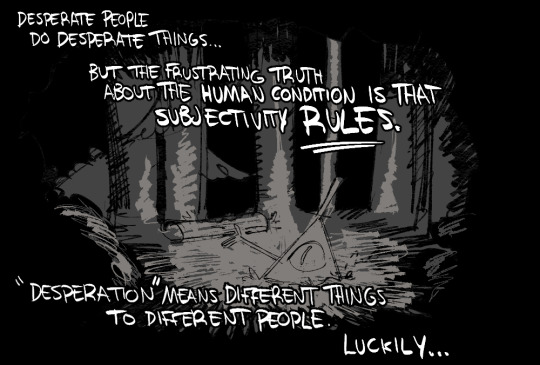


Part 1 | Next
[ASKBOX OPEN]
#gravity falls#bill cipher#the book of bill#gus burnside#gravity falls rp#ask bill cipher#gf au#narrative
685 notes
·
View notes
Text
Writing Tips - Character Tone VS Narrative Tone
Sometimes characters will do things that they believe are good or bad, but the narrative tone tells you otherwise. It can be hard for some people to separate the character’s feelings and actions with what the writer is personally agrees with, so let’s look into how we can make that happen - which also works as a media literacy guide of what to look for when theorising - and only theorising - if a writer does or doesn’t agree with a character;
1. Tonal dissonance. If a character’s mood doesn’t pass the scene’s vibe check, chances are that the character is about to do something the narrative isn’t framing as a good thing. Say Character A is telling Character B a secret they learned from Character C. B’s response might be to be confused or concerned about the situation and ask why A would tell them. Mixing in other bad vibes, such as the weather or setting or lighting of the scene, can additionally make the audience question whether the action was right - and bonus points if they also have the offending character acting poorly in other ways or getting called out for previous wrongdoings in the same scene
2. Karma’s a writer. Actions have consequences both in and out of your story, and using them to reward or punish choices your characters make can indicate whether or not they were the right thing to do. Expand on that through character interactions if you want more nuance
3. Hide away. A character hiding their actions for whatever reason can indicate that, even subconsciously, they’re aware that it wasn’t something others would approve of. Make them sweat, have them struggle to keep it secret. Let it lead to more wrong moves in future to cover up for the original issue, such as one lie covering for another lie. Let it become more trouble than it’s worth until they have to accept that they messed up, even if a bit of stress was the only karma they get for it in the end
4. Pick a theme. Between overarching themes and individual character themes, you can potentially come up with some pretty good long term lessons; if the character acts against the themes and the lesson they’re going to amount to, punish them for straying in a way that’s appropriate and proportional to the act, then work it into some sort of lesson for the character to learn. For example, if the theme is nature vs nurture and you want the lesson to be being true to yourself rather than what others make you into, a character acting on nurtured traits rather than natural traits might be punished through pressures to conform and the act getting amped up as further conflicts between the two sides of themselves present
5. Recruit a mouthpiece. Which character would be the most likely to call out the offending party’s BS? See if you can come to a scenario where they’d do so - albeit making sure it all stays natural and in-character. Maybe they go about it in a way that doesn’t even hit the mark, but at least it’s been said so your audience has had it addressed. Remember; don’t just insert X random character and have them be uncharacteristically analytical, have it be someone who would already do that and word it in a way that fits their character voice. Above all the interaction needs to feel natural rather than forced
#narrative#narrative tone#character tone#writing morals#writing#writers#writeblr#bookblr#book#writers on tumblr#writerscommunity#writers of tumblr#writer#creative writing#writing tips and tricks#writing is hard#writing advice#writing tricks#writing tips
653 notes
·
View notes
Text
Against Lore

For the rest of May, my bestselling solarpunk utopian novel THE LOST CAUSE (2023) is available as a $2.99, DRM-free ebook!

One of my favorite nuggets of writing advice comes from James D Macdonald. Jim, a Navy vet with an encylopedic knowledge of gun lore, explained to a group of non-gun people how to write guns without getting derided by other gun people: "just add the word 'modified.'"
As in, "Her modified AR-15 kicked against her shoulder as she squeezed the trigger, but she held it steady on the car door, watching it disintegrate in a spatter of bullet-holes."
Jim's big idea was that gun people couldn't help but chew away at the verisimilitude of your fictional guns, their brains would automatically latch onto them and try to find the errors. But the word "modified" hijacked that impulse and turned it to the writer's advantage: a gun person's imagination gnaws at that word "modified," spinning up the cleverest possible explanation for how the gun in question could behave as depicted.
In other words, the gun person's impulse to one-up the writer by demonstrating their superior knowledge becomes an impulse to impart that superior knowledge to the writer. "Modified" puts the expert and the bullshitter on the same team, and conscripts the expert into fleshing out the bullshitter's lies.
Yes, writing is lying. Storytelling is genuinely weird. A storyteller who has successfully captured the audience has done so by convincing their hindbrains to care about the tribulations of imaginary people. These are people whose suffering, by definition, do not matter. Imaginary things didn't happen, so they can't matter. The deaths of Romeo and Juliet were less tragic than the death of the yogurt you had for breakfast. That yogurt was alive and now it's dead, whereas R&J never lived, never died, and don't matter:
https://locusmag.com/2014/11/cory-doctorow-stories-are-a-fuggly-hack/
Hijacking a stranger's empathic response is intrinsically adversarial. While storytelling is a benign activity, its underlying mechanic is extremely dangerous. Getting us to care about things that don't matter is how novels and movies work, but it's also how cults and cons work.
Cult leaders and con-artists know that they're engaged in mind-to-mind combat, and they make liberal use of Jim's hack of leaving blank spots for the mark to fill in. Think of Qanon drops: the mystical nonsense was just close enough to sensical that a vulnerable audience was compelled to try and untangle them, and ended up imparting more meaning to them than the hustler who posted them ever could have dreamt up.
Same with cons – there's a great scene in the Leverage: Redemption heist show where an experienced con-artist explains to a novice that the most convincing hustle is the one where you wait for the mark to tell you what they think you're doing, then run with it (scambaiters and other skeptics will recognize this as a relative of the "cold reading," where a "psychic" uses your own confirmations to flesh out their predictions).
As Douglas Adams put it:
A towel has immense psychological value. For some reason, if a strag (strag: non-hitch hiker) discovers that a hitch hiker has his towel with him, he will automatically assume that he is also in possession of a toothbrush, face flannel, soap, tin of biscuits, flask, compass, map, ball of string, gnat spray, wet weather gear, space suit etc., etc. Furthermore, the strag will then happily lend the hitch hiker any of these or a dozen other items that the hitch hiker might accidentally have "lost". What the strag will think is that any man who can hitch the length and breadth of the galaxy, rough it, slum it, struggle against terrible odds, win through, and still knows where his towel is is clearly a man to be reckoned with.
Magicians know this one, too. The point of a sleight is to misdirect the audience's attention, and use that moment of misattention to trick them, vanishing, stashing or producing something. The mark's mind is caught in a pleasurable agony: something seemingly impossible just happened. The mind splits into two parts, one of which insists that the impossible just happened, the other insisting that the impossible can't happen.
You know you've done it right if the audience says, "Do that again!" And that's the one thing you must not do. So long as you don't repeat the trick, the audience's imagination will chew on it endlessly, coming up with incredibly clever things that you must have done (a clever conjurer will know several ways to produce the same effect and will "do it again" by reproducing the effect via different means, which exponentially increases the audience's automatic imputation of clever methods to the performer).
Not for nothing, Jim Macdonald advises his writing students to study Magic and Showmanship, a classic text for aspiring conjurers:
https://memex.craphound.com/2007/11/13/magic-and-showmanship-classic-book-about-conjuring-has-many-lessons-for-writers/
There's a version of this in comedy, too. The scholarship of humor is clear on this: comedy comes from surprise. The audience knows they're about to be surprised when the punchline lands, and their mind is furiously trying to defuse the comedian's bomb before it detonates, cycling through potential punchlines of their own. This ramps up the suspense and the tension, so when the comedian does drop the punchline, the tension is released in a whoosh of laughter.
Your mind wants the tension to be resolved ASAP, but the pleasure comes from having that desire thwarted. Comedy – like most performance – has an element of authoritarianism. You don't give the audience what it wants, you give it what it needs.
Same goes for TTRPGs: the game master's role is to deny the players the victories and treasure they want, until they can't take it anymore, and then deliver it. That's the definition of an epic game. It's one of the durable advantages of human GMs over video game back-ends: they can ramp up the epicness by "cheating" on the play, giving the players the chance to squeak out improbable victories at the last possible second:
https://wilwheaton.typepad.com/wwdnbackup/2009/03/behind-the-screen.html
This is so effective that even crude approximations of it can turn video-games into cult hits – like Left4Dead, whose "Director" back-end would notice when the players were about to get destroyed and then substantially ramped up the chances of finding an amazing weapon – the chance would still be low overall, but there would be enough moments when the player got exactly what they'd been praying for, at the last possible instant, that it would feel amazing:
https://left4dead.fandom.com/wiki/The_Director#Special_Infected
Critically, Left4Dead's Director didn't do this every time. As any showman knows, the key to a great performance is "Always leave 'em wanting more." The musician's successful finale depends on doing every encore the audience demands, except the last one, so the crowd leaves with one tantalyzing and imaginary song playing in their minds, a performance better than any the musicians themselves could have delivered. Like the gun person who comes up with a cooler mod than the writer ever could, like the magic show attendee who comes up with a more elaborate explanation for the sleight than the conjurer could ever pull off, like the comedy club attendee whose imagination anticipates a surprise that grows larger the longer the joke goes on, the successful performance is an adversarial act of cooperation where the audience willingly and unwillingly cooperates with the performer to deny them the thing that they think they need, and deliver the thing they actually need.
This is my biggest problem with the notion that someday LLMs will get good enough at storytelling to give us the tales we demand, without having to suffer through a storyteller's sadistic denial of the resolutions we crave. When I'm reading a mystery, I want to turn to the last page and find out whodunnit, but I know that doing so will ruin the story. Telling the storyteller how the story should go is like trying to tickle yourself.
Like being tickled, experiencing only fun if the tickler respects your boundaries – but, like being tickled, there's always a part where you're squirming away, but you don't want it to stop. An AI storyteller that gives you exactly what you want is like a dungeon master who declares that every sword-swing kills the monster, and every treasure chest is full of epic items and platinum pieces. Yes, that's what you want, but if you get it, what's the point?
Seen in this light, performance is a kind of sado-masochism, where the performer delights in denying something to the audience, who, in turn, delights in the denial. Don't give the audience what they want, give them what they need.
What your audience needs is their own imagination. Decades ago, I was a freelance copywriter producing sales materials for Alias/Wavefront, a then-leading CGI firm that was inventing all kinds of never-seen VFX that would blow people away. One of the engineers I worked with told me something I never forgot: "Your imagination has more polygons than anything you can create with our software." He was talking about why it was critical to have some of the action happen in the shadows.
All of this is why series tend to go downhill. The first volume in any series leaves so much to the imagination. The map of the world is barely fleshed out, the characters' biographies are full of blank spots, the mechanics of the artifacts and the politics of the land are all just detailed enough that your mind automatically ascribes a level of detail to them, without knowing what that detail is.
This is the moment at which everything seems very clever, because your mind is just churning with all the different bits of elaborate lore that will fill in those lacunae and make them all fit together.
SPOILER ALERT: I'm about to give some spoilers for Furiosa.
.
.
.
.
.
.
.
.
FURIOSA SPOILERS AHEAD!
Last night, we went to see Furiosa, the latest Mad Max movie, a prequel to 2015's Fury Road, which is one of the greatest movies ever made. Like most prequels, Furiosa functions as a lore-delivery vehicle, and as such, it's nowhere near as good as Fury Road.
Fury Road hints as so much worldbuilding. We learn about the three fortresses of the wasteland (the Citadel, the Bullet Farm, and Gastown) but we only see one (The Citadel). We learn that these three cities have a symbiotic relationship with one another, defined by a complex politics that is just barely stable. We meet Furiosa herself, and learn something of her biography – that she had been stolen from the Green Place, that she had suffered an arm amputation.
All of this is left for us to fill in, and for a decade, my hindbrain has been chewing on all of that, coming up with cool ways it could all fit together. I yearned to know the "real" explanation, but it was always unlikely that this real explanation would be as enjoyable as my own partial, ever-unfinished headcanon.
Furiosa is a great movie, but its worst parts are the canonical lore it settles. Partly, that's because some of that lore is just stupid. Why is the Bullet Farm an open-pit mine? I mean, it's visually amazing, but what does that have to do with making bullets? Sometimes, it's because the lore is banal – the solarpunk Green Place is a million times less cool than I had imagined it. Sometimes, it's because the lore is banal and stupid: the scenes where Furiosa's arm is crushed, then severed, then replaced, are both rushed and quasi-miraculous:
https://www.themarysue.com/how-does-furiosa-lose-her-arm/
But even if the lore had been good – not stupid, not banal – the best they could have hoped for was for the lore to be tidy. If it were surprising, it would seem contrived. A story whose loose ends have been tidily snipped away seems like it would be immensely satisfying, but it's not satisfying – it's just resolved. Like the band performing every encore you demand, until you no longer want to hear the band anymore – the feeling as you leave the hall isn't satisfaction, it's exhaustion.
So long as some key question remains unresolved, you're still wanting more. So long as the map has blank spots, your hindbrain will impute clever and exciting mysteries, tantalyzingly teetering on the edge of explicability, to the story.
Lore is always better as something to anticipate than it is to receive. The fans demand lore, but it should be doled out sparingly. Always leave 'em wanting more.

If you'd like an essay-formatted version of this post to read or share, here's a link to it on pluralistic.net, my surveillance-free, ad-free, tracker-free blog:
https://pluralistic.net/2024/05/27/cmon-do-it-again/#better_to_remain_silent_and_be_thought_a_fool_than_to_speak_and_remove_all_doubt
#pluralistic#writing#lore#series#science fiction#the elaborations of a bad liar#always leave em wanting more#james d mcdonald#guns#pilkunnussija#craft#Silmarillion#sf#Better to Remain Silent and Be Thought a Fool than to Speak and Remove All Doubt#magic tricks#conjuring#narrative#mad max#furiosa
1K notes
·
View notes
Text
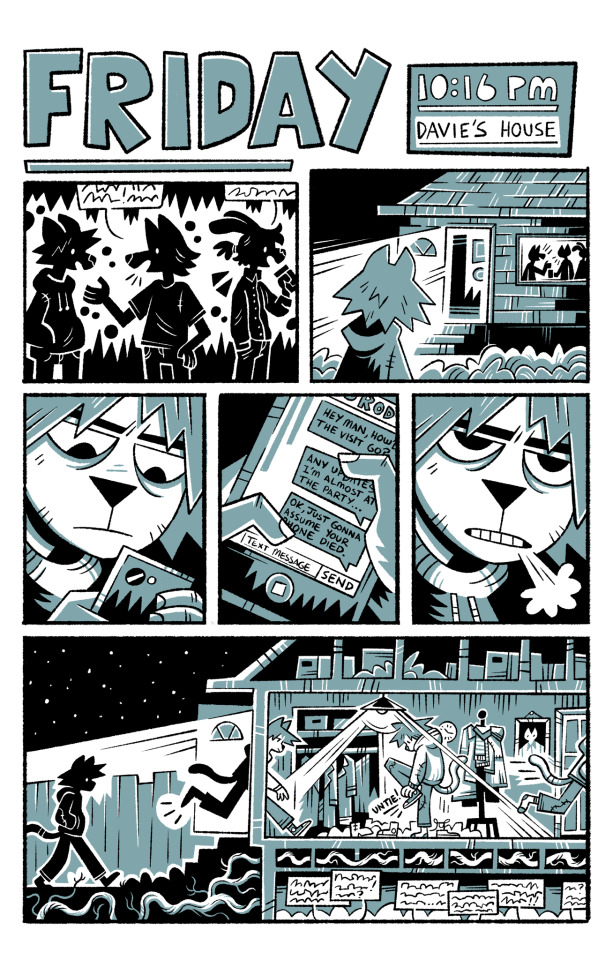
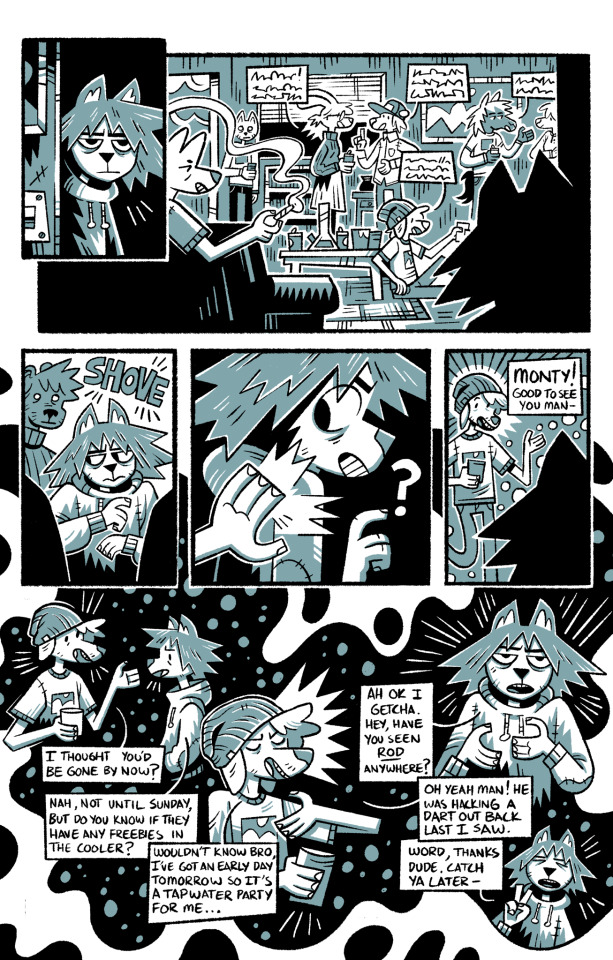
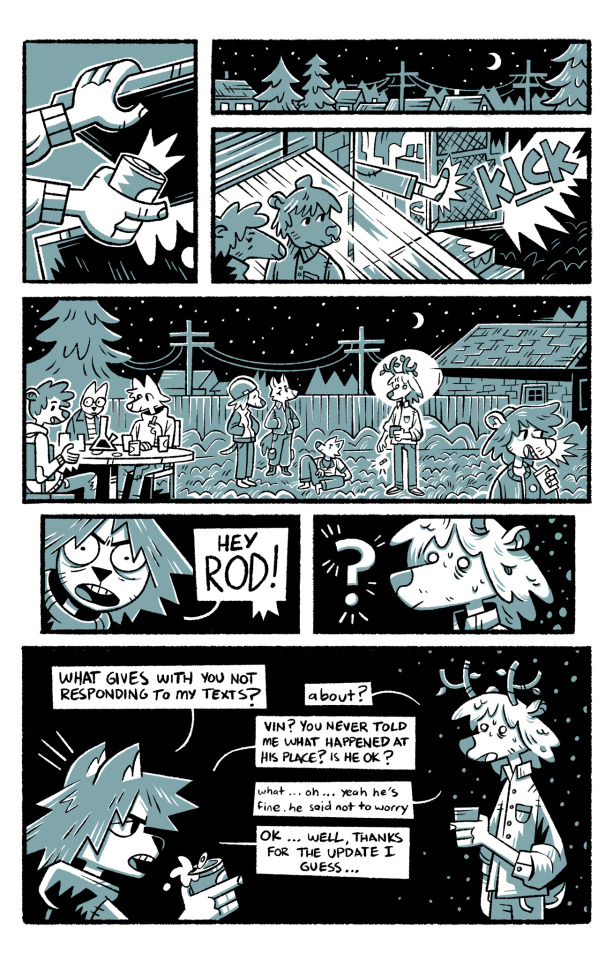

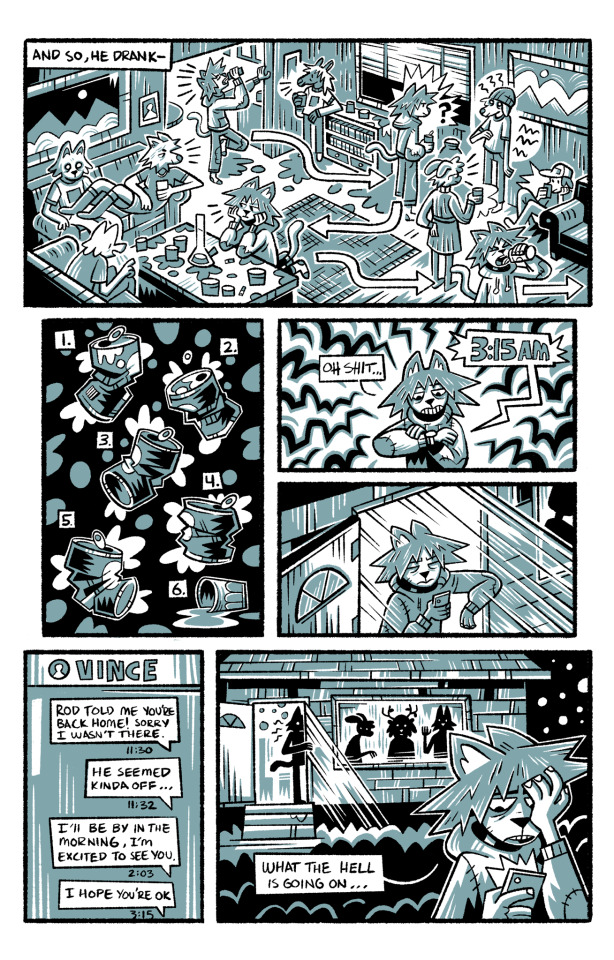
“The Wind Beneath the Aspens”
-5 page pitch created during August of this year
#illustration#sketchbook#anthro#art#drawing#procreate#furry art#furry#sketch#character design#comicart#comics#comic#webcomix#webcomic#narrative#cartoon#drugs cw#alcohol cw
1K notes
·
View notes
Text

Moral Qualms and Modern Anxieties Lurk in Owen Gent’s Illustrations
387 notes
·
View notes
Text
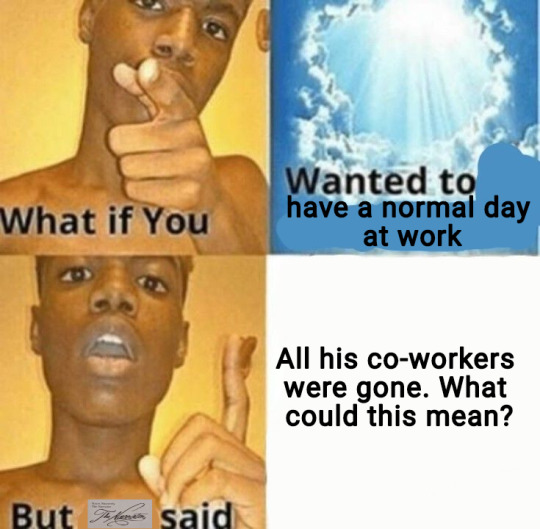
#iddybittysnail#the stanley parable#tsp#tspud#the stanley parable ultra deluxe#the stanley parable 2#427#employee 427#shit post#meme#the narrator tsp#the narrator#narrator#narratorverse#tsp narrator#narrative#the stanley parable narrator
418 notes
·
View notes
Text
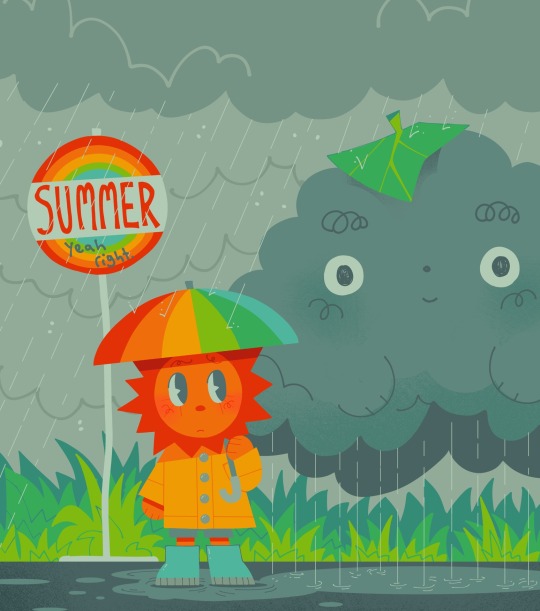
���️ for my university’s newspaper! nz had a lot of rain last summer… 🌈
872 notes
·
View notes
Text
Create a monster, and I will show you your reflection
Night has fallen. Lightning crackles in the sky above. It is time for you to create an abomination. But what manner of horror will spring from your hands?
-
I blacked out and made another narrative uquiz. Give it a play, tag what you get!
413 notes
·
View notes
Text
rotating hamlet in your head when you're NOT mentally unwell is actually a wonderful experience. because now you can see outside the barbed walls of pain. beyond the balcony rails that look like prison bars. you can see the glimmers of gertrude's undeniable love for hamlet, even when she did it all wrong. you can see the defiance in ophelia's yes my lords, a sort of kindredness to the women you grew up with who knew how to pick battles and hide a smirk. you can see the banter between horatio and hamlet, like boys playing in a creek before one moves away for good. you can watch hamlet mouth the plays the thing, wherein ill catch the conscience of the king and have your heart break for the scared son who's clinging to a reason to live through narrative. and oh, how you notice the narrative. how it encircles. how it continues, despite laertes trying to fling himself to be with ophelia, despite horatio's lips almost kissing the cup. now, you can hold the characters gently, with the distance and closeness of a gravedigger. now, you can hold yourself gently: act five is over now. close the curtains, strike the props, hug the other ones who made it out covered in fake blood and real sweat. the play's the thing, and you might have to do it again. the story lives, on and on and on, in a hundred adaptations in a hundred formats. in a hundred broken peoples heads, and sometimes, those people heal long enough to say denmark was a prison, let me tell you about it.
#hamlet#shakespeare#horatio#ophelia#gertrude#we're not doomed by the narrative!!!#narrative#poetry#? sorta
266 notes
·
View notes